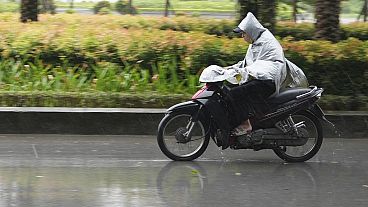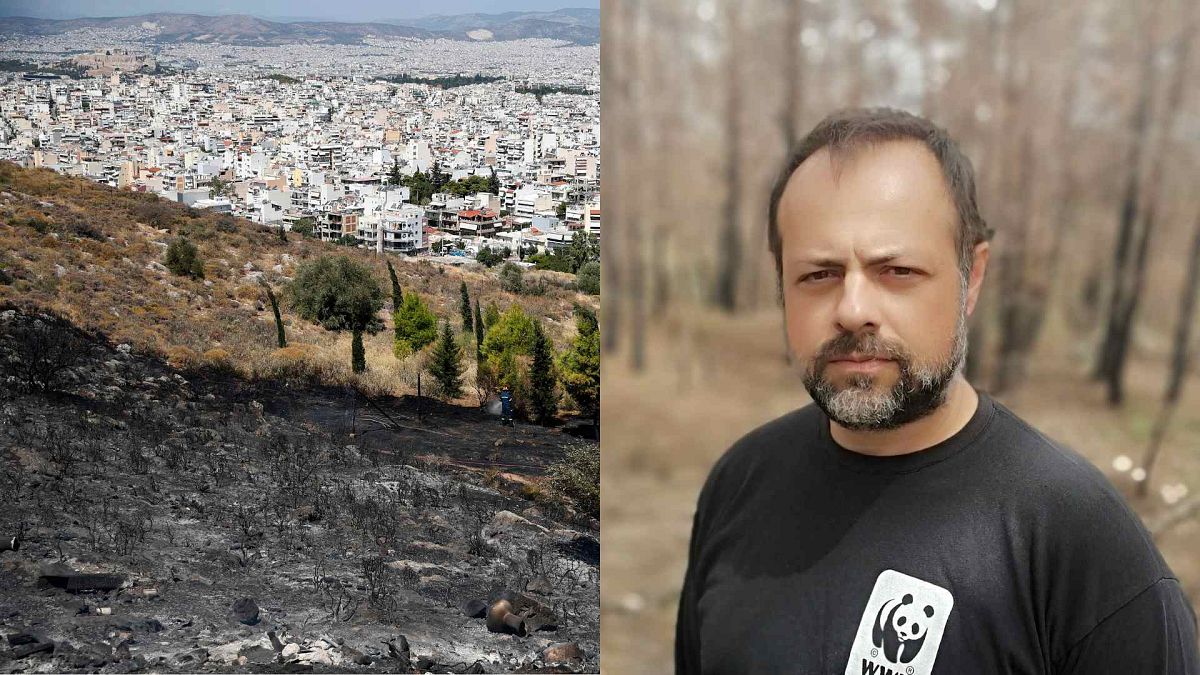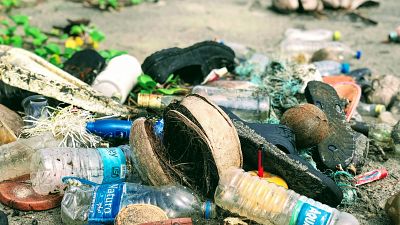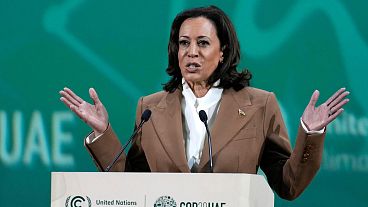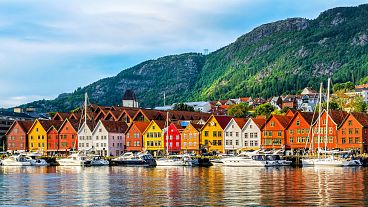Greece is one of the countries worst affected by global warming.
When Elias Tziritis visits pockets of Greece scorched and scarred by wildfires, he worries about the future. “You start thinking about your children or grandchildren,” the environmentalist says.
“But as a scientist, you cannot speak in human timelines. You must think in nature's timeline.”
Kalavrita-born Tziritis is Greece’s World Wide Fund for Nature (WWF) coordinator of actions for forest fires. It is his job to help monitor and advocate for the Mediterranean landscape.
He started working with the Swedish not-for-profit in 1995 as a volunteer before becoming staff in 2004. But his obsession with what’s flammable flickered long before, and it germinated from fear. “I was a climber,” he says, “and I was loving forests.”
“After the big fires of the ‘90s, because I saw a lot of forests destroyed – the sorts of forests where I liked to go hiking – I thought, ‘I must do something to protect this forest, to have this forest to hike in the future.”
Wildfire seasons are now longer and more intense
Greece’s fire season officially starts in May and ends in October – but Tziritis says these dates are becoming increasingly pliable.
Frequent heatwaves and less rain have made the southern European country’s landscape combustible, with critics claiming emergency services and government spending cannot keep up.
Based on what he sees on the ground, as a scientist and one of 10,000 Civil Protection volunteer firefighters, the country’s season starts in April and ends in November. “These fire seasons are expanding,” Tziritis says. “They are becoming more severe, bigger surfaces; mega-fires, and the problem is our answer.”
A 'dire' shortage of firefighting power
The deadly, record-breaking 2023 fires – that ripped through Alexandroupolis, Attica, Rhodes and Corfu, among other regions and islands – demonstrated Greece’s “dire” firefighting shortage and the government’s “complete lack of fire prevention and management planning,” according to Greek Member of the European Parliament (MEP)Kostas Papadakis.
The criticism was echoed byforest fire academics, who argued the dangerous season “highlighted the inadequacies of the Greek fire management system” catalysed by scores of deaths and damaged infrastructure.
Over 73,000 hectares burned in the Alexandroupolis fire, which prompted the European Union’s environmental agency Copernicus to dub Greece “the eye of Europe’s wildfire storm” in 2023.
Fire prevention is key
A year on, in July 2024, Prime Minister Kyriakos Mitsotakis said the country was bracing for a “particularly dangerous” summer as hot, dry weatherfuels wildfires.
He said the government had spent “millions” of euros in wildfire prevention, with the European Union providing Greece with six aircrafts and one helicopter, and the option to use a 556-member strong firefighting fleet.
But Tziritis says if the Greek government does not invest in prevention as well as firefighting mechanisms, such as trucks and hoses, mega blazes will continue consuming the country. “This is not the solution,” he says. “They bring new doctors, bring more firefighters, but they don't work in the communities.”
Euronews Green put these claims to Greece's Ministry of Citizen Protection and Ministry of the Environment and Strategy but they did not respond.
How Portugal changed tack after 2017 fires
Greece is not the first European country to battle deadly fires, of course. Its southern European neighbour Portugal was set alight in 2017, with a firestorm in the country’s regional centre killing 66 people and injuring 44 others.
Prime Minister António Costa referred to the disaster, which tore through 540,000 hectares of land, as "the greatest tragedy of its kind we have seen in recent years” and acknowledged the state's responsibility in its spread.
Julia Bognar heads up the Brussels-based Institute of European Environmental Policy. She tells Euronews Green that Portugal is a “good example” of a government that scaled-up its response following a blaze. To her, it says Portugal is willing to learn from “negative” events.
“Some examples are for people living in rural areas. Such as giving directions on how to clear debris in areas that they live in… and making sure that brush and tree overhang are a bit further away from their houses,” she explains.
A change in tree cover changed everything in Portugal
The largest shift, however, was an agricultural one: Portugal moved away from its reliance onmonoculture plantations. In the past, wood pulp acted as tinder that fanned the flames. “They had big monocultures of eucalyptus trees, and eucalyptus trees are quite flammable, and they can create drier conditions,” Bognar says, adding, “they increased the spread and intensity of fires.”
“Since then, there's been moves to make sure these trees aren't dangerous, and for also protecting certain other types of species of trees as well, so the government has been trying to take more different preventative actions.”
Following the fires, the Portuguese government introduced a law designed to halt the growth of domestic eucalyptus plantations, and although the mighty wood sector still retains a European stronghold nearby in Spain, it moved out of the country. Despitecriticism from some sectors, many saw this as a victory.
Bognar says it’s normal for countries to be taken “off guard” by the scale and intensity of wildfires. After all, they occurred less frequently and with less force decades ago. But now, countries must prepare for the worst. “It can be an impetus towards taking both reactions so more response capacity, but also prevention as well,” she says.
This is something Tziritis recognises. He says that the Portuguese authorities responded to the deadly 2017 fires by ordering a review of what happened then enforcing the report’s recommendations and reinstating community confidence. “The government did this,” he says, but in Greece “people are afraid of change”.
‘How many people are going to lose a life?’
Over the weekend, Tziritis visited a national park in Mount Xerovouni, northern Evia. Although the landscape is now green with bushes and saplings, he says you don’t have to be a fire expert to recognise the forest is in recovery. What was a verdant patchwork of pine, fir, beech and chestnut trees is now just “burnt tree bodies” surrounded by young growth.
Tziritis says that the landscape will most likely recover – as long as it doesn’t catch fire in the next 20 years. The avid outdoorsman admits that this is extremely unlikely.
Although Tziritis has dedicated his life to the natural landscape, he believes that fires don’t just damage the physical environment – they also have a corrosive effect on peoples’ lives.
“I do not know how many national parks we are going to lose. How many people are going to lose a life or their income,” he says.
“It's not only the forest fire – it's what happens after the fires. Desertification, erosion, social and economic issues, and what happens to local societies. It is one of Greece’s biggest issues.”



